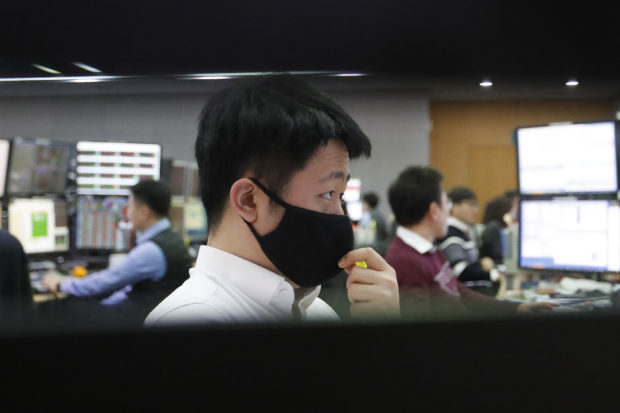TOKYO — Asian shares rose Thursday, taking their cue from a surge on Wall Street as governments and central banks took more aggressive measures to fight the virus outbreak and its economic impact.

A currency trader wearing a face mask watches monitors at the foreign exchange dealing room of the KEB Hana Bank headquarters in Seoul, South Korea, Thursday, March 5, 2020. Asian shares rose Thursday, taking their cue from a surge on Wall Street as governments and central banks took more aggressive measures to fight the virus outbreak and its effects on the economy.(AP Photo/Ahn Young-joon)
Japan’s benchmark Nikkei 225 rose 0.8% to 21,262.49. Australia’s S&P/ASX 200 added 1% to 6,390.60. South Korea’s Kospi gained 0.7% to 2,073.99. Hong Kong’s Hang Seng jumped 1.2% to 26,529.35, while the Shanghai Composite surged 1.4% to 3,053.91. Shares also rose in Southeast Asia.
The gains on Wall Street more than recouped big losses from a day earlier as wild, virus-fueled swings around the world’s markets extended into a third week.
Shares in Chinese blue chips rose Thursday in Hong Kong, suggesting “investors’ confidence was restored by the surge in U.S. markets. We don’t have the panic selling evident last week when the market fell sharply,” said Francis Lun, a stock analyst in Hong Kong.
Stocks rose sharply from the get-go, led by big gains for health care stocks after Joe Biden solidified his contender status for the Democratic presidential nomination. Investors see him as more business-friendly than Bernie Sanders.
The rally’s momentum accelerated around midday after House and Senate leadership reached a deal on a bipartisan $8.3 billion bill to battle the coronavirus outbreak. The measure’s funds would go toward research into a vaccine, improved tests and drugs to treat infected people.
The S&P 500 rose 4.2% to 3,130.12. The benchmark index has had five days in the last two weeks where it swung by more than 3%. In all of last year, it had just one. The Dow Jones Industrial Average gained 4.5% to 27,090.86. The Nasdaq climbed 3.8%, to 9,018.09. The index, which is heavily weighted with technology companies, now has a slight gain for the year.
The Russell 2000 index of smaller company stocks rose 3%, to 1,531.20.
“Despite the specter of coronavirus lurking over the world’s economy, all appears well with the world, judging by Wall Street’s overnight performance,” Jeffrey Halley of Oanda said in a commentary. “China’s rate of new infections has plunged, even as coronavirus makes its presence felt in the far-flung corners of the globe.”
Investors are also anticipating other central banks will follow up on the Federal Reserve’s surprise move Tuesday to slash interest rates by half a percentage point in hopes of protecting the economy from the economic fallout of the new coronavirus.
Canada’s central bank cut rates on Wednesday, also by half a percentage point and citing the virus’ effect.
Some measures of fear in the market eased. Treasury yields rose but were still near record lows in a sign that the bond market remains concerned about the economic pain possible from the fast-spreading virus.
Companies around the world are already saying the virus is sapping away earnings due to supply chain disruptions and weaker sales, with General Electric becoming the latest to warn its investors.
Even though many investors say they know lower interest rates will not halt the spread of the virus, they want to see central banks and other authorities do what they can to lessen the damage.
The S&P 500 sank 2.8% on Tuesday after a brief relief rally triggered by the Fed’s rate cut fizzled.
“Monetary policy can only take us so far, but at least it’s a step,” said Jack Ablin, chief investment officer at Cresset. “Investors will take comfort in coordinated central bank action. I take comfort in knowing this isn’t the plague, we’ll eventually get through this.”
The Bank of England has a meeting on March 26 on interest rates. The European Central Bank and others have already cut rates below zero, meanwhile, which limits their monetary policy firepower. But economists say they could make other moves, such as freeing up banks to lend more.
Data released Wednesday showed the U.S. economy still holding up, at least as of last month. The country’s services industries grew at a faster rate last month than economists expected, according to a report from the Institute for Supply Management.
Hiring at private employers was stronger than expected in February, according to a report from payroll processor ADP, though slower than January’s pace. That could be an encouraging sign for the comprehensive jobs report coming from the government at the end of the week.
ENERGY: Benchmark crude oil rose 55 cents to $47.33 a barrel in electronic trading on the New York Mercantile Exchange. It fell 40 cents to settle at $46.78 a barrel. Brent crude oil, the international standard, gained 71 cents to $51.84 a barrel.
CURRENCIES: The dollar fell to 107.31 Japanese yen from 107.55 yen on Wednesday. The euro edged up to $1.1138 from $1.1131.